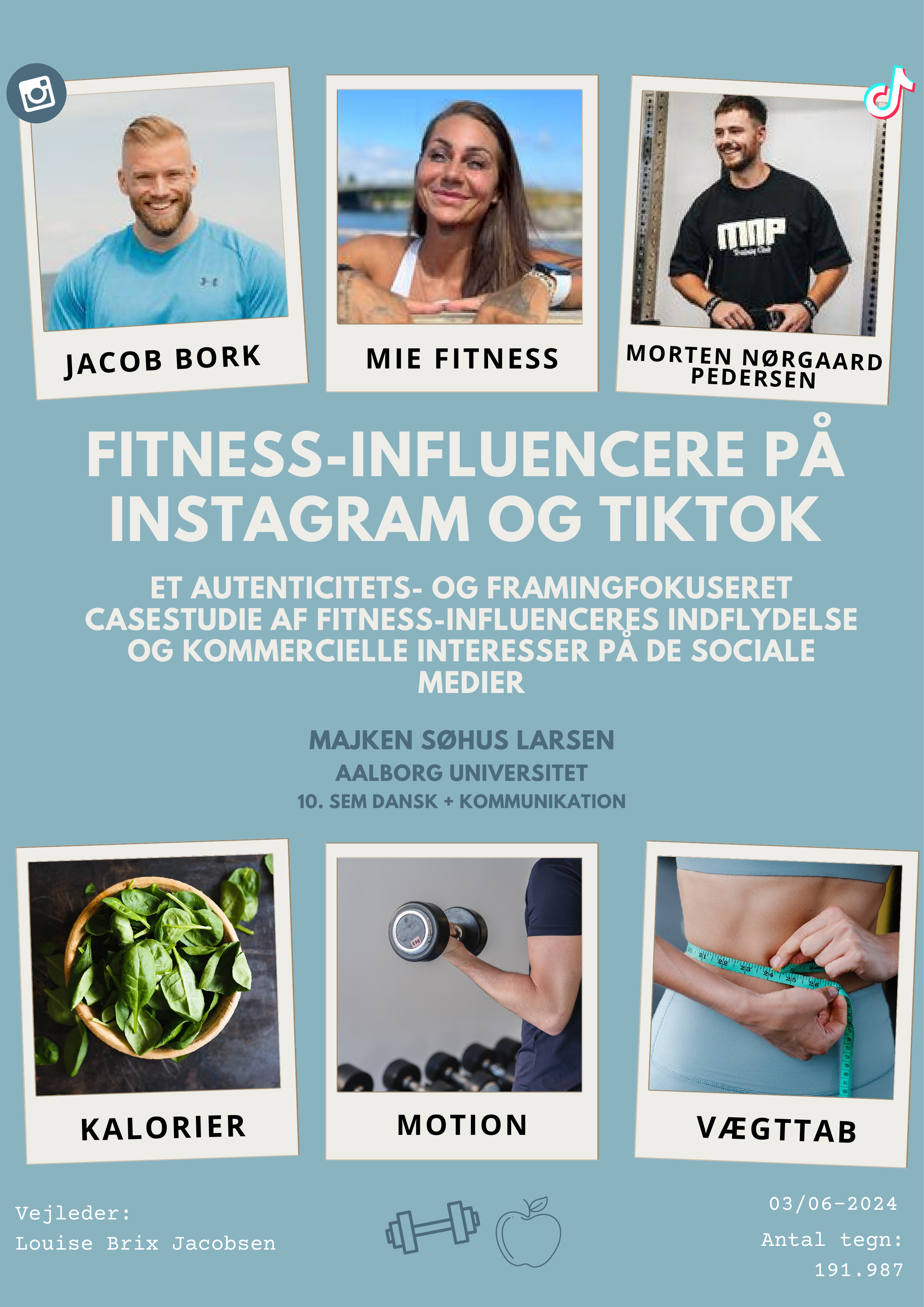
Fitness-influencere på Instagram og TikTok: Et autenticitets- og framingfokuseret casestudie af fitness-influenceres indflydelse og kommercielle interesser på de sociale medier
Oversat titel
Fitness-influencers on Instagram and TikTok: An authenticity and framing focused case study of fitness influencers' influence and commercial interests on social media
Forfatter
Semester
4. semester
Uddannelse
Udgivelsesår
2024
Afleveret
2024-05-31
Antal sider
79
Abstract
This Master’s thesis examines how so-called fitness-influencers exploit authenticity and framing on the social media platforms, Instagram and TikTok, to create an impact that not only motivates their audiences to adopt a healthy lifestyle, but also drives sales of fitness-services. This thesis is driven by observations of mine about the danish fitness-influencer industry on Instagram and TikTok. In recent years social media and the population of influencers have expanded and provided more options for ordinary people to gain fame and benefit financially from sharing their lives and communicating through self-proclaimed expertises online. A fitness-influencer specializes in health and fitness-related content and seeks to motivate their followers to adopt a health-related experience or behavior. The fitness-influencer's effectiveness of delivering messages and impacting their audience relies on three credibility factors, which professor Julia Durua et al. (2022) calls trustworthiness, expertise and attractiveness. During my observations prior to this case study, I have discovered a popular tendency among fitness-influencers that includes video-posts where they confirm or debunk widely known health and fitness myths based on self-proclaimed titles such as personal trainers or coaches. These are not protected titles in Denmark and do not demand any educational requirements. While this tendency provides the industry with popular content, I however, see a problem arise within this tendency as fitness-influencers often are self-proclaimed health experts and personal trainers who base their health advice on personal opinions and are driven by commercial interests such as selling their personal training courses. These fitness-influencers therefore often lack the necessary professional background to validate their health claims based on scientific evidence, which is why their advice might not be as truthful, authentic and beneficial as they present it to be. In order to investigate my observations and my thesis statement I will make a case study, in which I do qualitative research and use a multiple case research design, where I will use three selected danish fitness-influencers and three of their respective video-posts. The three selected video-posts are all a part of this myth-tendency and includes a confirmation or disconfirmation of a health or fitness-related myth. I am motivated to use professor Gunn Enli, Stuart Cunningham and David Craighs approaches and concepts of authenticity in order to examine and interpret how the three fitness-influencers exploit and create authenticity through social media. In addition to this I also wish to apply sociologist Robert Enmants framing concepts in my research in order to examine how health and fitness are being presented by fitness-influencers and interpreted by the audience in the comment sections. I wish to examine and interpret which experiences and behaviors these posts have on the receivers in order to examine how they are being impacted and motivated by the fitness-influencers to adopt a healthy lifestyle. Through this case study, it is argued that fitness-influencers exploit authenticity and framing to their own social and financial benefits. This is argued because these fitness-influencers use media affordances and several communicative strategies such as profile work, in which they use the title personal trainer as a marker of identity, small stories, forms of appeal and frames involving selection, salience, surface frames, deep frames and cultural frames repetitively. I argue that the fitness-influencers use these communicative tools to promote and highlight themselves, their expertise and the personal training courses they sell. Based on my research, I will argue that these tools are used by fitness-influencers to select aspects of their perceived reality about healthy lifestyles and weight loss in order to make them more salient in their online communication and to motivate the audience to adopt certain behaviors in order to lose weight. The three fitness-influencers' use of these tools also indicates that they have an ambition for creating and exploiting authenticity in order to create a trustworthy identity online, where the audience have enough faith in their expertise to follow their health and fitness advice. Furthermore, I will argue that these tools are used by fitness-influencers to stand out among other fitness-influencers and health information on social media in order to promote themselves and their coaching-businesses.
